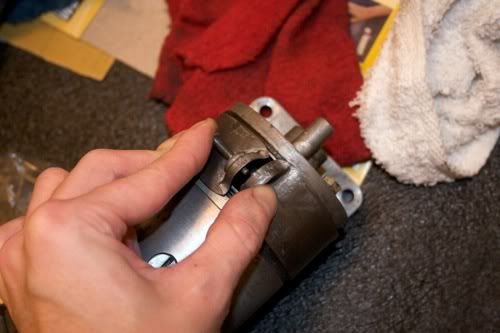
Here's the clutch crankcase prepped and ready to be painted in the garage. You can see the bike in the background under the plastic tarp.

Here's a shot of me in action for everyone of the forum. Here I am adding a second coat of primer to the clutch crankcase cover. I'm not intending to hide my identity. I'm rather bundled up for protection from the litany of things involved in painting/restoring a motorcycle. I've written off this set of clothes as damaged already. I have to say that my respirator is one of my favorite purchases. A $40 investment is quite the bargain considering the cancer and birth defects it helps you avoid. You can see a small sliver of light illuminating the stream of paint from the garage door being cracked open.

I added some JB Weld to a few minor imperfections, scratches, and gouges on the case. After applying the primer I noticed that I hadn't sanded them smoothing enough. The texture really became apparent one the primer was added. I also don't feel like I pushed the epoxy deep enough into the gouges, as a few still remain. Trying to figure out a solution to that. More primer to attempt to fill it, or adding a spot putty/sanding, then more primer?

This had quite a bit of external aluminum corrosion as well as oil deposits that built up on the inside of the cover. A 48 hour soak in parts cleaner and scuff pad seemed to do the trick getting it prepped. There's a few slight imperfection in the body, but I'm hoping with another coat or two of primer they can be sanded out.
 These guys weren't looking so hot
These guys weren't looking so hot when I got them off the bike. They're now quickly on their way to show condition.


Here is the chain guard stripped and primered. It will soon be painted black.
As you'll see here, someone decided to paint it silver along the way.

- - - - - - - -
All parts were sandblasted with aluminum oxide media then cleaned (petroleum based parts cleaner to avoid flash rust), and prepped with a 320 grit 3M scuff pad. All parts are being primered with
Dupli-Color Ceramic High Heat Engine Primer (500°).
Taken from Duplicolor's site: "Both Engine Enamel and High Heat Paint formulas now contain ceramic resins for maximum heat dissipation and gloss retention. The resins also offer protection from exposure to excessive heat and automotive fluids. Developed and tested in the lab, Dupli-Color® Engine and High Heat Paints will perform to the most rigorous standards of racing and street rod enthusiasts."














